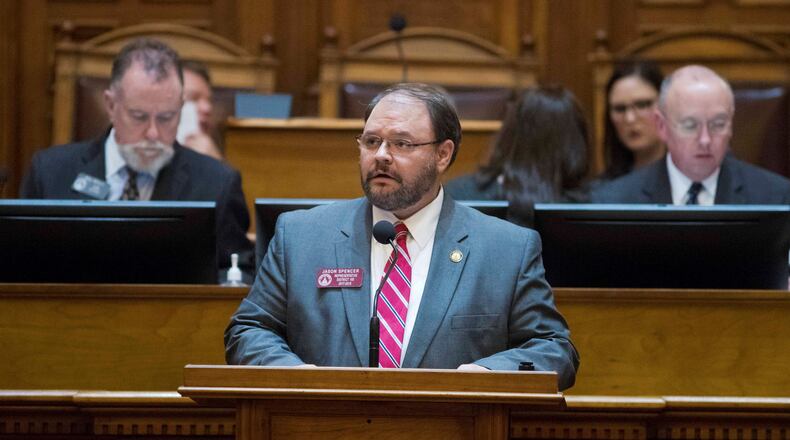Adults who realize later in life that they were sexually abused as children will have more time to sue under legislation that advanced through the Georgia House of Representatives Wednesday.
The Hidden Predator Act of 2018 builds on a similar law from three years ago, portions of which have expired. Among the changes proposed by House Bill 605: an extension of the civil statue of limitations to age 38 from the current 23.
Rep. Jason Spencer, R-Woodbine, the chief sponsor, said the proposed change acknowledges “that the effects of child abuse are latent,” with victims coming forward, on average, at age 42.
The most controversial element is a 1-year window that allows victims of any age to sue both the alleged perpetrator and the “entity” -- a church, organization or other group that oversees children -- associated with the alleged abuse.
Lawsuits have claimed that groups such USA Gymnastics and the Boy Scouts of America failed to protect children from abuse.
The legislation as Spencer proposed it would have allowed new claims against such groups despite the passage of decades. But to get his bill to the House floor, he accepted a compromise that narrowed their liability during that 1-year window, which would begin July 1.
Under the new language, entities can only be sued if the alleged victims can prove a coverup. That pretty much means they have to be defendants in an existing lawsuit that has revealed damning documents through the discovery process, Spencer said. “That’s not my favorite part of the bill, but at least it does provide a pathway” to sue, he told The Atlanta Journal-Constitution.
The legislation was further amended, in a committee and on the House floor, to reduce liability for individuals associated with organizations that allegedly allowed abuse to occur.
Rep. Bert Reeves, R-Marietta, who led a subcommittee that vetted the bill, said the tougher burden of proof won’t protect truly bad actors from accountability.
“The burden is high but where the facts are there to prove a coverup, this will provide accountability,” he said.
A final element of the legislation adds two years to the current 2-year window during which victims of any age can sue if they only recently remembered being abused. They would have to obtain a professional diagnosis that they suffered personally -- from substance abuse or other issues -- due to the abuse, and a judge would explore whether they’d disclosed knowledge of the abuse to anyone outside that 4-year window.
The House voted unanimously -- 170-0 -- to send the bill to the Senate, where opponents -- Spencer has said the Scouts, the Catholic Church, the insurance industry and the Georgia Chamber of Commerce quietly lobbied against it -- can still change it or altogether prevent it from becoming law. Last week, the Scouts issued a confusing statement that said that they both supported and did not support the bill.
About the Author





